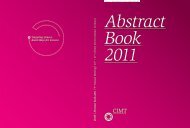Abstract Book 2010 - CIMT Annual Meeting
Abstract Book 2010 - CIMT Annual Meeting
Abstract Book 2010 - CIMT Annual Meeting
Create successful ePaper yourself
Turn your PDF publications into a flip-book with our unique Google optimized e-Paper software.
044 Kalos | Cellular therapy<br />
Clearance of established leukemia in a mouse xenograft model<br />
by a single injection of primary T cells gene-modified to express<br />
chimeric antigen receptors that target CD19<br />
Michael Kalos 1 , David M. Barrett 2 , Carmine Carpenito 1 , Stephan A. Grupp 2 and Carl June 1<br />
1 Abramson Family Cancer Research Institute, University of Pennsylvania, Philadelphia, PA<br />
2 Division of Oncology, Children’s Hospital of Philadelphia, Philadelphia, PA<br />
88<br />
We are evaluating the potential to use T-cells re-<br />
directed by genetic engineering to target human<br />
tumors. Chimeric antigen receptors (CAR), developed<br />
by combining antigen binding domains from<br />
antibodies or T cell receptors (TcR) to T cell signalling<br />
domains offer a potentially powerful platform<br />
to mediate tumor re-targeting.<br />
To re-target T cells against B cell malignancies we<br />
are focusing on the CD19 molecule, a membrane<br />
glycoprotein found on human B lymphocytes and<br />
expressed by the vast majority of B cell tumors. We<br />
have generated a CAR that consists of an extracellular<br />
scFv domain derived from an antibody that<br />
targets CD19 linked to the intracellular signalling<br />
domain of the TcR zeta chain. To criticaly evaluate<br />
the effects of including signaling domains from T cell<br />
costimulatory on CAR functionality and anti-CD19targeting<br />
CAR we introduced signalling domains<br />
from CD28 or CD137 (41BB) domains into the anti-<br />
CD19 CAR, transduced such CAR into primary<br />
human CD8+ and CD4+ T cells, and evaluated<br />
the ability of the transduced T cells to eradicate<br />
established aggressive CD19+ leukemia cell line<br />
Nalm-6 in the highly immunodeficient NOG mouse<br />
model. We evaluated primary lymphocytes gene<br />
modified to express anti-CD19-targeting CAR that<br />
contain TcRζ —alone, CD28-TcRζ, CD137-TcRζ—,<br />
and CD28-CD137-TcRζ — signaling domains.<br />
Mice treated with a single dose of T cells engineered<br />
to express each of the anti-CD19 CAR demonstrated<br />
statistically significant improved survival over con-<br />
trols animals. The CD19-CD28-CD137-ζ — CAR mediated<br />
the longest median overall survival and the<br />
most mice surviving until the end of the study at<br />
Day 180. In vivo bioluminescent imaging shows the<br />
kinetics of leukemia clearance to be rapid (within<br />
72 hours), and proves a sensitive tool for tracking<br />
disease relapse.<br />
These data demonstrate the potential of CAR directed<br />
to the CD19 molecule to effectively redirect T<br />
cells to eradicate established bone marrow disease<br />
with a single injection of CAR modified cells. Future<br />
efforts will focus on enhancing in vivo persistence<br />
and surveillance capabilities of these CAR T-cells,<br />
as well as investigating the ability of CAR T cells to<br />
clear repeated challenges of leukemia.



